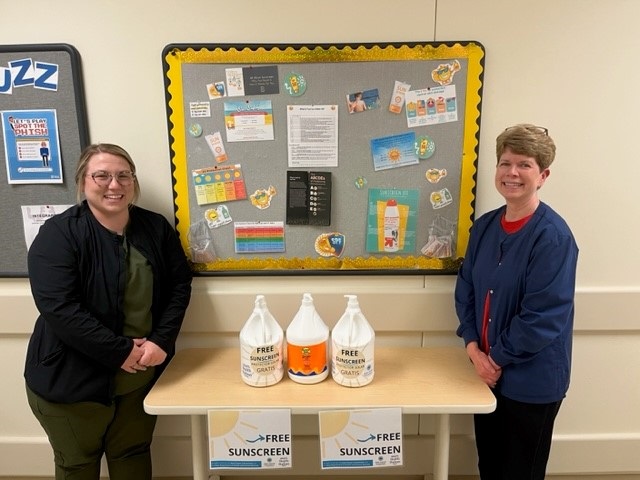Greene County public health has received three of the more than 80 gallons of sunscreen distributed through the Sun-Safety Community Project for this summer. The Iowa Cancer Consortium and the Iowa Department of Public Health and Human Services join forces for this annual program that promotes healthy skin protection habits.
“We have many community partners throughout Greene County who are working with us to provide free sunscreen and information about sun safety,” said Greene County public health director Becky Wolf. “As the weather gets warmer and we spend more time outdoors, we need to protect our skin from too much ultraviolet (UV) light exposure. These invisible rays from the sun, tanning beds and sunlamps damage skin cells and cause skin cancer. Tanning is neither safe nor healthy, and is actually a sign of injury to the skin.

According to the American Academy of Dermatology (AAD), nearly 9,500 individuals receive a skin cancer diagnosis every day, making it the most common in the US. Of the three types, squamous and basal cell carcinomas and melanoma, melanoma is the deadliest as it often spreads to other parts of the body. The Iowa Cancer Registry predicts that with our fifth in the nation ranking for increased melanoma rates, about 1,300 Iowans will be diagnosed with melanoma in 2023.
Changes in the skin are the most common signs of cancer. Changes in size, shape and color of moles and other skin growths should be monitored using the ABCDEs of melanoma: asymmetry, border, color, diameter and evolution. Any changes over a few weeks or months should be checked by your primary care provider.
Skin cancer affects people of all ages and skin colors, so everyone should protect themselves using the five S’s: SLIP on lightweight, light-colored clothing that covers arms and legs; SLOP on sunscreen with an SPF of at least 30 and reapply every two hours—don’t forget SPF lip balm; SLAP on a tightly woven hat with a brim that covers the face, head, ears and neck; SEEK shade or shelter, especially during the peak sun hours of 10 am to 4 pm; and SLIDE on UV-blocking sunglasses to protect the eyes and the sensitive skin around them.
”We are excited to be able to educate community members about the risks of UV exposure as well as the ways they can protect their skin this summer through this safety project. Whether you are slopping on sunscreen from one of those gallons or sliding on protective eyewear, you are doing your part to reduce the risk of sun damage and skin cancer,” Wolf added.
Persons who want more information can call 515-386-3228.
